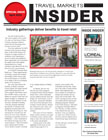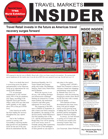 By Sally Alington, Founder & CEO of Ethos Farm and Lauren Walsh Co-Founder of Ethos Farm Americas
By Sally Alington, Founder & CEO of Ethos Farm and Lauren Walsh Co-Founder of Ethos Farm Americas
‘I don’t take coffee, I take tea my dear’, the opening line from Sting’s 1987 hit an ‘Englishman in New York’ which famously lists all manner of differences between the Americans and the British, a few of which we’d say are somewhat questionable (does anyone really have their toast done on one side?). Apply this thinking to the travel retail industry and, as new-comers to the Americas market, we are discovering there are some interesting distinctions, as well as real best practices, from both sides of the Atlantic when it comes to delivering excellent service and boosting sales in-store.
We established Ethos Farm Americas in 2017 having worked in the travel retail industry in the UK for more than 25 years between us. In fact, together we built one of the largest flexible travel retail solutions businesses in Europe, working with UK travel retail operators across 23 airports, spanning all product categories and supporting the majority of big brand names in the industry. We also delivered services in partnership with airport operators such as Heathrow Airport Limited, Global Infrastructure Partners (owners of Gatwick, Edinburgh and London City) and Manchester Airport Group (owners of Manchester, Stansted and East Midlands). Outside of the UK we also operated in the Republic of Ireland and Dubai.
Together we developed and devised new ways to drive spend in airport retail, not only duty free, through concepts like airport personal shoppers, pop-up shops and retail-entertainment, as well as flexible solutions to drive ancillary revenues including F&B. That is why early last year, we decided to start our new venture in the USA and, with a base in New York, we have started some amazing working partnerships with travel retail brands and shops alike.
As avid travelers ourselves, we had often flown through US airports for work or fun and pondered some of the noticeable differences between the US and UK shopper experience. Delivery of product to the gate from the Duty Free shop for example, which in the USA is a normality and for some passengers is possibly more convenient. However, from the British mindset, we immediately began to question how the in-store sales staff could overcome what we perceived as a potential barrier to purchase for customers not used to this practice. Could there be missed sales opportunities when there is not enough time to get the product collected from the store and delivered to the aircraft door?
Solutions that some travel retailers have put into practice are certainly doing their bit to make sure sales opportunities are not missed. Dufry’s Reserve & Collect program is a great example of ensuring customers don’t miss out on the products they really want in the airport, as well as tapping into the passenger’s consciousness before they have even left home for their flight. But what about customers who hadn’t planned to shop at all, and maybe don’t consider shopping and flying as things that necessarily go hand in hand?
We have long believed that if the passenger can’t get to the shop, then the shop should come to the passenger. Shopping in airports should be an easy part of air travel and we need look no further than Newark Airport’s Terminal C, the ‘Airport of the Future,’ for inspiration. With iPad’s in the catering areas to allow convenience of ordering and paying for food and drinks from the comfort of the seating area, the airport has most certainly taken the passenger experience to a different level. This should be ‘food for thought’ for airport retailers and operators to look at breaking out of traditional shopping zones and opening wider retailing conversations with airport operators and airlines.
While Newark’s iPad dining concept hasn’t only been met with positivity, most of the negative views stem from the lack of interaction with human beings, which some have commented, is making the airport experience lonelier than it should be. We believe this concept can be more appealing and work for retail by combining great customer service or product specialist staff with virtual shopping technologies at points of the passenger journey normally not associated with retail-therapy. Unsurprisingly people like to communicate with people, ask questions and reaffirm their decision-making choices. It is the blend of great people interactions with innovative ways of browsing product and purchasing that can really be the point of difference and should be something for travel retailers to further explore.
Another area that we are excited to be driving forward with US airport travel retailers is destination-tailored service and sales, drawing on our experiences from working in the UK. Having the right staff, speaking the right language, in the right place at the right time is a formula we have tried to perfect over the years. What other retail environment has the gift of knowing approximately how many passengers will be coming through the doors and when, where they are traveling to and generally speaking what those customers like to buy! Why wouldn’t airports and retailers use this information to ensure the experience is customised in the right way?
In fact, we have seen that correctly applied destination targeting strategies for instore staffing and promotions can deliver three or four times more ROI than providing people without advanced cultural understanding and linguistic capabilities. Mandarin-speaking ambassadors tend to top the list of requests we receive, however there are many nationalities who would welcome a more personalised approach to in-store service.
The differences in airport retail around the world are some of the reasons why we enjoy traveling as ultimately, we like to go to new places to learn about ways of life, traditions and customs that are different to our own. However, when it comes to maximizing sales and improving customer experiences, some things are universal. Customer expectations, no matter how different they may be in each corner of the globe, should be exceeded wherever possible to ensure the continued growth of this industry and that requires an enhanced focus on talent selection, learning and development.











